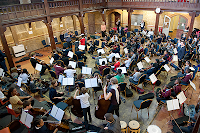 |
| Stockwell Children's Orchestra in rehearsal |
The hall where they rehearse is impressive, a huge galleried brick structure, presumably a remnant of a Victorian School building. The strings of the orchestra are meeting for an hour's rehearsal under Gerry, the project leader. There are nearly 30 children, all primary school age. In Harmony Lambeth looks after over 400 children in total, the orchestras cater for primary school children, but once they join secondary schools players can still come back for the after school clubs and holiday activities.
This being Lambeth, the children are a varied mix of races. They come from three different schools, some arrive late and there is some coming and going. But what impresses is the seriousness and concentration, they might not all be able to yet play their instrument perfectly, but they are intent on doing their best.
In Harmony Lambeth is a social enterprise, they are aiming to create socially responsible individuals as well as musicians. They encourage a mentoring system, so that older players mentor younger ones. Gerry's direction of the orchestra also includes a lot of dialogue with the children; they do not just play, they have to think, to suggest ways of solving a musical problem that has arisen. In one piece, Purcell's Chaconne, they are offered a choice of bowing and have to vote on the one they prefer. Gerry's questions also extend to the era of the music's composition (correctly answered as baroque) and the children are recommended to go home and listen to some baroque music.
At the start of the session, Gerry announces that they are looking for new section leaders and a new orchestra leader. Those chosen get to wear badges, but they are expected to set an example, focus, concentrate and mentor others. At the end of the session, whilst the children put away their instruments, tidy away the stands and chairs and music in cheerfully industrious chaos, Gerry and the four tutors decide and announce the new appointees to great applause. The children will be returning tomorrow, for the rehearsal of the full Stockwell Children's Orchestra.
The four adult tutors play with the children, wandering around and ensuring that everyone knows what they are supposed to be doing. Some kids are alarmingly small and determined, even when obviously going wrong. The sole double bass player is a young boy playing a diminutive double bass, that is still bigger than he. There are also one or two older children, now at secondary school, who come back to help mentor.
There are short sectional rehearsals, to enable the different groups to play together better. Singing of the music is one of the many tools used to help them along. It is clear that they are listening, after practice tune improves noticeably as the first violins adjust so they do tine with the cellos.
The orchestra has a concert in London's South Bank on Wednesday 12 December so a lot of the rehearsal is taken up with concert behaviour and details to to ensure the performance goes smoothly and the children know how to behave. And next week a quintet of senior players from the orchestra will be playing at the House of Lords.
Such performing opportunities are part of the Sistema ethos, those attending will generally be family and friends of the children involved. In this way the system (El Sistema) extends beyond the children themselves to their families. In Venezuela El Sistema has been running for 35 years, started by Jose Abreu in a garage, there are now 300 youth orchestra in the country with over 400,000 children currently in the system. In Harmony - Sistema England is rather younger, having been started by Julian Lloyd Webber. The project is growing, the Arts Council this year announced further projects so that there are now projects in Lambeth, Leeds, Liverpool, Newcastle and Gateshead, Nottingham and Telford.
As someone who benefited from state instrumental tuition in the 60's and 70's, was a member of two youth orchestras and two school orchestra, I can testify to the powerful effect this can have. Playing in an orchestra is a social enterprise which involves far more skills that simply learning an instrument. The influence also spreads out to the friends and family of the players who, after all, remain the primary audience members for their performances.
Later this year a group of In Harmony project leaders will travel to Venezuela to observe El Sistema in action, let us hope that this will inspire them all.
Further information from the In Harmony website, where there is also a gallery of photos of Thursday's rehearsal.
Elsewhere on this blog:





.jpg)







No comments:
Post a Comment